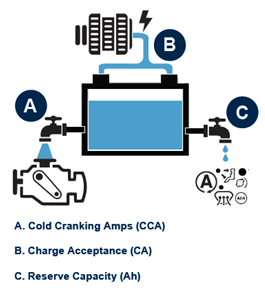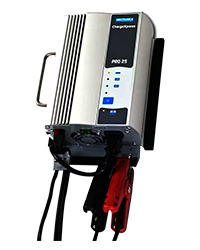Know about the Critical Aspects of Car Battery Charger
Battery Charger
A battery charger, recharger, or simply charger, is a device that stores energy in a battery by running an electric current through it.
Why is a Battery Charger important?
Several safety mechanisms are built into battery chargers to guard against overcharging, short circuits, and overheating. These safety features protect not just the batteries but also the environment and the operators’ well-being.
What is the function of Battery Charger?
The battery operates as an electrolytic cell while it is charging. The electrons in the cathode are compelled to return to the anode when the cell is connected to an external energy source. In the Vehicle Battery Charger – electrons are moving from the anode to an external power source. Electrons are extracted from the cathode on the other side.
Is Battery charging necessary?
To guarantee that lead acid batteries live out their anticipated lives, regular charging is necessary. It is a wise purchase. Purchasing a charger is more cost-effective in the long run than replacing the batteries. It is expected of cars to start when needed and to be dependable.
What is important when charging a battery?
When it comes to car battery management, constant voltage-current limited charging is optimal for achieving the highest possible battery service life and capacity, as well as an acceptable recharge time and economy. A DC voltage of 2.30 volts per cell (float) to 2.45 volts per cell (fast) must be delivered to the battery’s terminals in order to charge a sealed lead acid battery.
State Of Charge (SOC)
A battery can be charged or discharged. It is considered charged at a voltage value above 12.5, partially charged at values from 12 to 12.5, and discharged below 12. This state of charge says something about the charge only and nothing about the container of that can be charged. This means that if the battery has lost capacity. It can still be 100% charged. Temperature is an important factor that can be of influence in measuring state of charge.
State of Charge is separated from Charge Acceptance. Charge Acceptance rates how well the battery is still accepting charge from either battery charger or alternator. A bad Charge Acceptance may indicate the battery requires replacing, or that there’s an issue with the internal electrical system of the vehicle.

State Of Health (SOH)
Can the battery support the car as needed?
- CCA
- AH (Reserve Capacity)
We like to refer to it as the battery’s capacity or its health condition. It speaks to the ability of the battery to perform compared to the battery’s rating (CCA). When a battery is damaged and has lost capacity, the condition, the state of health has deteriorated.
You can compare the State of Health of a battery to a milk carton; if there’s a dent in the carton it can still be filled up to maximum capacity, and yet retain less actual content. In a battery’s case this lessened State of Health is often caused by internal sulfation.
Within state of health, besides CCA, we also take up reserve capacity. The traditional use of a battery, starting the car, requires a large amount of current at once. Today’s vehicles consume a battery with car electronics, like start-stop systems, at a low amount of current for a long period of time.
Solution for Battery Charger from ATS ELGI
MIDTRONICS CHARGEXPRESS PRO 25-5
The ChargeXpress PRO 25 is the Entry specialty charger and Power supply.
Charges all 12 Volt batteries.
- It is smart as it recognizes charge acceptance and allows you to support the battery of cars during service, maintenance routines
- It is PORTABLE, SAFE & EASY to use.

Conclusion
Effective vehicle battery management is crucial for ensuring optimal performance and longevity of your car’s battery. At ATS ELGI, we offer comprehensive solution for your car battery management such as Battery Tester , Jump Starter, and Battery Charger to keep your vehicle running smoothly and avoid costly replacements or repairs.
REFERENCES:
MIDTRONICS PRODUCT CATALOG 2021-2022
